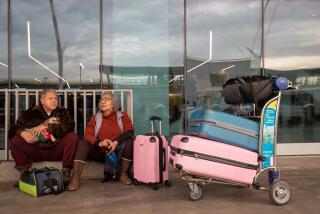Entrepreneurs Design Cards Intended to Skewer Airlines
- Share via
WASHINGTON — Byron Kline has this theory.
“Airlines generate strong emotions. Trains don’t. Buses don’t. Hotels don’t,” he philosophized. “Car rental companies, well, maybe just a little.”
A little isn’t enough, of course, when you are talking about big business, so the 49-year-old Kline and his partner, independent business consultant Dick Salvatierra, 47, are attempting to mine the rich vein of passion people have about commercial flight with their fledgling greeting card company, Zap’em Corp., based in Bethesda, Md.
The two, who are racquetball partners, were rooting around for an entrepreneurial idea last year when they decided that there was a need out there in terminal hell for an organized way to gripe. Ergo: cards that grill airlines for late flights, lost bags, bad food and really old magazines.
One card shows a passenger being carried by a turkey with the caption: “There are terrific ways to travel. Yours was not one of them!” Another turkey-themed one pictures the birds slumped in front of an arrival-departure sign reading “delayed,” “overbooked” and “canceled,” and says, “You do things differently! How about doing them right!?”
Included with the cards are addresses for all the major airlines and the names of their executives, so disgruntled travelers can get through to the top.
“People are more likely to say something when they do not receive what they paid for than when they receive outstanding service,” said Kline, a former trucking company executive who took a “three-year vacation” when he sold his trucking stake in 1988. “So we thought it would make a good business.”
It could be. The $4.4-billion greeting card industry is expected to grow to $5.6 billion by 1995, according to New York-based Packaged Facts. It is dominated by big firms such as Hallmark, American Greetings and Gibson Greetings with a combined share of more than 85% of the market.
Smaller card companies have made strides in the past decade, and sales of alternative cards are expected to grow from 10% to 20% annually.
Zap’em’s founders test-marketed their product at Baltimore-Washington International Airport by buttonholing travelers. They toned down the meaner cards after they found out that unhappy customers did not want to slam an airline, but rather wanted the ability to point out problems.
More to Read
Inside the business of entertainment
The Wide Shot brings you news, analysis and insights on everything from streaming wars to production — and what it all means for the future.
You may occasionally receive promotional content from the Los Angeles Times.








